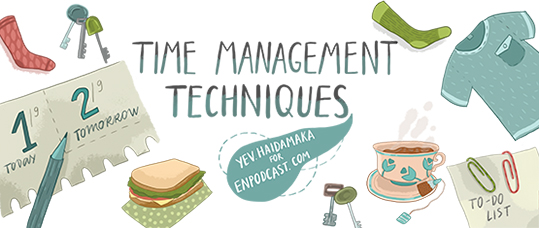Time Management Techniques
Think of your daily routine? How do you usually start your day and how does it pass? So, let's imagine your typical Monday or Wednesday…
The alarm clock rings at 06.30 and you are fighting the temptation to sleep extra 5 minutes, then 10 minutes, then again 5 minutes and finally you start rushing around the house, hysterically drinking your cup of cold coffee and simultaneously putting on your jacket. As a result, you are late for work and you are completely down because of such a morning mess. And logically, I can assume that the rest of the day will be spent in a similar disorder.
Why has everything happened in such a way? Why do the majority of people have problems with deadlines and with their time management in general? Only one answer is possible – they do not plan their time efficiently.
You need to learn how to manage your day and prioritize the tasks. By doing so you will save your time, as such arranging helps you work smarter, not harder. With the help of these easy but almost magical techniques one can learn how to identify and focus on the most pivotal activities and something that will bring you the highest return. What is more, these very techniques will help you to beat work overload – a key source of stress.
One of such techniques is almost primitive thus usually ignored because of its simplicity. I am talking about a “to do” list. If you want to plan your day, week or month effectively, force yourself to have a habit of making such kind of lists.
The next step in this logical chain is closely connected with the “to do” list. What I mean now is efficient delegation of the tasks from your “to do” list. This way you may enhance your list and make it a powerful weapon in beating the work overload.
So, first of all, decide which points in your list are urgent and important, something that is a number-one priority for you. You can mark these items with A. Then think over the urgent but not important tasks, these can be labeled with B. After that go the C tasks – important, but not urgent, and finally, the D tasks – those are neither important nor urgent. Whilst arranging the tasks one should remember the difference between important and urgent tasks. So, urgent are the tasks which have to be done as soon as possible. And important items are the things by completing which one can achieve an important objective.
Consequently, by using these two simple techniques, you can increase your chances of managing your time and beating your alarm clock for at least one hour every day!
Vocabulary:
- to rush around – to try to do a lot of things in a short period of time
- to prioritize the tasks – to put several tasks in order of importance, so that one can deal with the most important ones first
- simultaneously – things that happen at exactly the same time
- pivotal – more important than anything else in a situation, system etc.
- work overload – when someone gets too much work at one time and becomes tired and unable to think very carefully about any pieces of it
- to enhance – to improve something
- to beat an alarm clock – to wake up earlier than an alarm clock rings
















